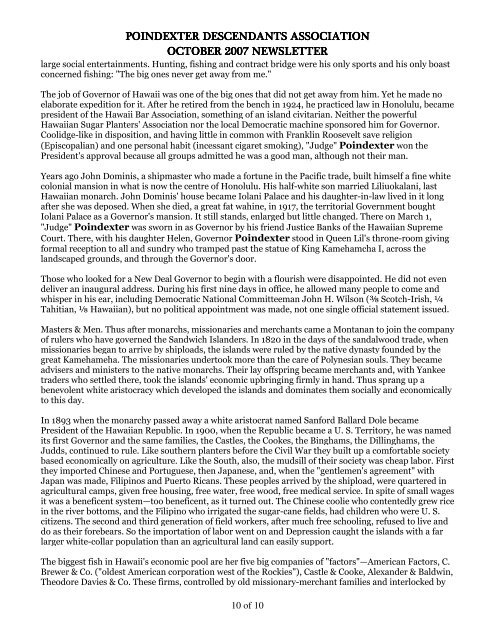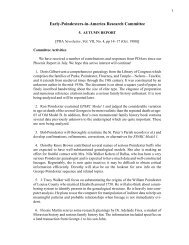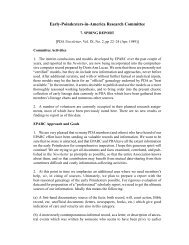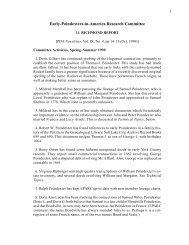new members - Poindexter Descendants Association
new members - Poindexter Descendants Association
new members - Poindexter Descendants Association
Create successful ePaper yourself
Turn your PDF publications into a flip-book with our unique Google optimized e-Paper software.
POINDEXTER POINDEXTER POINDEXTER DESCENDANTS DESCENDANTS DESCENDANTS ASSOCIATION<br />
ASSOCIATION<br />
ASSOCIATION<br />
OCTOBER OCTOBER 2007 2007 NEWSLETTER<br />
NEWSLETTER<br />
NEWSLETTER<br />
large social entertainments. Hunting, fishing and contract bridge were his only sports and his only boast<br />
concerned fishing: "The big ones never get away from me."<br />
The job of Governor of Hawaii was one of the big ones that did not get away from him. Yet he made no<br />
elaborate expedition for it. After he retired from the bench in 1924, he practiced law in Honolulu, became<br />
president of the Hawaii Bar <strong>Association</strong>, something of an island civitarian. Neither the powerful<br />
Hawaiian Sugar Planters' <strong>Association</strong> nor the local Democratic machine sponsored him for Governor.<br />
Coolidge-like in disposition, and having little in common with Franklin Roosevelt save religion<br />
(Episcopalian) and one personal habit (incessant cigaret smoking), "Judge" <strong>Poindexter</strong> won the<br />
President's approval because all groups admitted he was a good man, although not their man.<br />
Years ago John Dominis, a shipmaster who made a fortune in the Pacific trade, built himself a fine white<br />
colonial mansion in what is now the centre of Honolulu. His half-white son married Liliuokalani, last<br />
Hawaiian monarch. John Dominis' house became Iolani Palace and his daughter-in-law lived in it long<br />
after she was deposed. When she died, a great fat wahine, in 1917, the territorial Government bought<br />
Iolani Palace as a Governor's mansion. It still stands, enlarged but little changed. There on March 1,<br />
"Judge" <strong>Poindexter</strong> was sworn in as Governor by his friend Justice Banks of the Hawaiian Supreme<br />
Court. There, with his daughter Helen, Governor <strong>Poindexter</strong> stood in Queen Lil's throne-room giving<br />
formal reception to all and sundry who tramped past the statue of King Kamehamcha I, across the<br />
landscaped grounds, and through the Governor's door.<br />
Those who looked for a New Deal Governor to begin with a flourish were disappointed. He did not even<br />
deliver an inaugural address. During his first nine days in office, he allowed many people to come and<br />
whisper in his ear, including Democratic National Committeeman John H. Wilson (⅜ Scotch-Irish, ¼<br />
Tahitian, ⅛ Hawaiian), but no political appointment was made, not one single official statement issued.<br />
Masters & Men. Thus after monarchs, missionaries and merchants came a Montanan to join the company<br />
of rulers who have governed the Sandwich Islanders. In 1820 in the days of the sandalwood trade, when<br />
missionaries began to arrive by shiploads, the islands were ruled by the native dynasty founded by the<br />
great Kamehameha. The missionaries undertook more than the care of Polynesian souls. They became<br />
advisers and ministers to the native monarchs. Their lay offspring became merchants and, with Yankee<br />
traders who settled there, took the islands' economic upbringing firmly in hand. Thus sprang up a<br />
benevolent white aristocracy which developed the islands and dominates them socially and economically<br />
to this day.<br />
In 1893 when the monarchy passed away a white aristocrat named Sanford Ballard Dole became<br />
President of the Hawaiian Republic. In 1900, when the Republic became a U. S. Territory, he was named<br />
its first Governor and the same families, the Castles, the Cookes, the Binghams, the Dillinghams, the<br />
Judds, continued to rule. Like southern planters before the Civil War they built up a comfortable society<br />
based economically on agriculture. Like the South, also, the mudsill of their society was cheap labor. First<br />
they imported Chinese and Portuguese, then Japanese, and, when the "gentlemen's agreement" with<br />
Japan was made, Filipinos and Puerto Ricans. These peoples arrived by the shipload, were quartered in<br />
agricultural camps, given free housing, free water, free wood, free medical service. In spite of small wages<br />
it was a beneficent system—too beneficent, as it turned out. The Chinese coolie who contentedly grew rice<br />
in the river bottoms, and the Filipino who irrigated the sugar-cane fields, had children who were U. S.<br />
citizens. The second and third generation of field workers, after much free schooling, refused to live and<br />
do as their forebears. So the importation of labor went on and Depression caught the islands with a far<br />
larger white-collar population than an agricultural land can easily support.<br />
The biggest fish in Hawaii's economic pool are her five big companies of "factors"—American Factors, C.<br />
Brewer & Co. ("oldest American corporation west of the Rockies"), Castle & Cooke, Alexander & Baldwin,<br />
Theodore Davies & Co. These firms, controlled by old missionary-merchant families and interlocked by<br />
10 of 10





